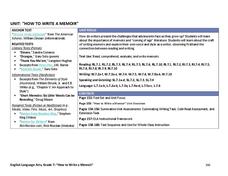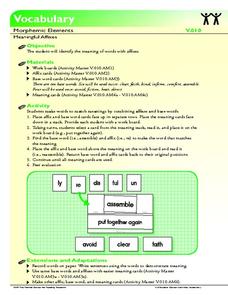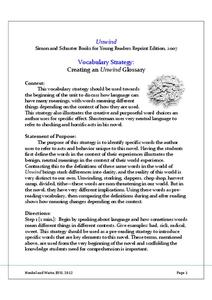The New York Times
Writing Fiction Based on Real Science - NYTimes.com
Refuse to alienate your scientific-minded young scholars during your creative writing unit. Learners explore how literary writing can reflect observable fact, and be based in actual science. The links include examples of fiction and...
Syracuse City School District
Literary Elements
Address the literary elements in a piece of writing using these materials. The packet includes plenty of resources, and focuses mainly on theme, character, and point of view, with some materials for setting, symbolism, and author's...
Hood River County School District
Text Structure: Features and Organization
Teach learners how to interact with both fiction and non-fiction text with a packet of activities and worksheets. After looking over text structure and the difference in text features between different types of writing, readers analyze...
New York City Department of Education
What Did I Do to Be so Black and Blue: How Did Jazz Influence Ralph Ellison's Invisible Man
How did jazz influence Ralph Ellison's Invisible Man? Class members read some of Ellison's non-fiction writings about blues and jazz, listen to records, watch videos, and engage in student-centered discussions. They then produce podcasts...
Louisiana Department of Education
How to Write a Memoir
Who are we and what shapes our identities? Seventh graders work to answer this question as they learn how to write a memoir. Full of non-print resources and supplemental texts that range from fiction to non-fiction, scholars write their...
Curated OER
Dusty Locks and the Three Bears
Read this twist on Goldilocks and the Three Bears: Dusty Locks and the Three Bears by Susan Lowell. Kindergartners listen, predict, and discuss the story. They then participate in a dramatization of the story and draw a picture to...
Florida Center for Reading Research
Vocabulary: Morphemic Elements, Meaningful Affixes
Invite learners to determine which affix and base word combinations create new words. This activity allows pupils to play around and create words that match specific meanings.
Hawaiʻi State Department of Education
Story Design
Stories contain very specific elements; plot, characters, and key events. Learners use pantomime to retell a key event from the beginning, middle, and end of a story. They discuss setting and character as each group discusses and then...
Curated OER
Unwind: Vocabulary Strategy, Creating an Unwind Glossary
Prior to reading Unwind, Neal Shusterman's 2007 young adult science fiction novel, class members research the common definition of words drawn from the novel that will come to have a very different meaning to them as they are drawn into...
Curated OER
The Rest Cure: Gender in Medicine and Literature
Read and discuss "The Yellow Wall-Paper" and the gender issues that the story brings up. Use articles from the time period to analyze, complete with specific discussion questions. After two days, scholars write an essay based on topics...
Ontario
Reading Informational Text
Learning to recognize the importance of the features of information text (i.e., titles, subtitles, endnotes, sidebars, etc.) is the focus of a reading activity designed for middle schoolers. Learners examine how these text features help...
Consortium for Ocean Science Exploration and Engagement (COSEE)
Understanding the Food Web
Building on prior knowledge of the pervious lesson in the series, pupils explain the previous lesson to each other. Then they write a simple guide for a young child to read on the same topic.
Curated OER
Nonfiction Genre Mini-Unit: Persuasive Writing
Should primary graders have their own computers? Should animals be kept in captivity? Young writers learn how to develop and support a claim in this short unit on persuasive writing.
Curated OER
A River Ran Wild: An Environmental History
The Nashua River serves as the focal point of an investigation of the treatment of and care for natural resources. A reading of A River Rand Wild: An Environmental History by Lynne Cherry, launches the study and class members consider...















